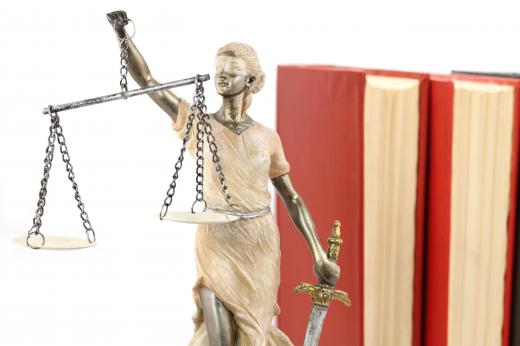At MyLawQuestions, we're committed to delivering accurate, trustworthy information. Our expert-authored content is rigorously fact-checked and sourced from credible authorities. Discover how we uphold the highest standards in providing you with reliable knowledge.
What is Rico Law?
The Racketeering Influenced and Corrupt Organizations (RICO) Act is a group of federal laws passed by the United States Congress in 1970 to deal with organized racketeering activity. RICO law is specifically directed at individuals or organizations involved in systematic, long-term illegal activities. It increases criminal penalties and allows civil claims to be pursued by injured parties against individuals, businesses or groups for actions taken as part of a criminal organization. An individual can be charged with racketeering under RICO statutes if, within a 10-year time frame as part of a criminal enterprise, he or she commits two crimes from a list of 35 detailed in the act.
Of the 35 crimes that form the body of RICO law, eight are state crimes and 27 are federal. Bribery, gambling, murder, arson, extortion, prostitution, counterfeiting, drug dealing, acts of terrorism and kidnapping are among the 35 crimes. It also is possible to prosecute white-collar crimes under RICO law. Embezzlement and obstruction of justice appear on the list, as do mail, wire, bankruptcy and securities fraud.

The RICO Act originally was legislated to prosecute the Mafia and others involved in organized crime, but over time, the definition of what constitutes racketeering activity has expanded. Consequently, the application of RICO law has broadened to include a variety of individuals, organizations and activities. Among other enterprises, RICO law has been applied to drug cartels, street gangs, corrupt police departments, political parties, protest groups, terrorist organizations, corporations, managed care companies, bankers and insurance and securities firms.

Both criminal and civil punishments exist for violations of RICO law. A convicted defendant may be sentenced to as much as 20 years in prison for each racketeering count and/or fined up to $250,000 US Dollars. In addition, the defendant forfeits all rights over the enterprise and any gains derived from the racketeering activity. Defendants also may be sued in civil court, where a plaintiff may be awarded as much as three times the amount he or she lost. The intent of the many punishments and penalties is to completely cripple and eliminate the organized criminal enterprise involved.

Legislation equivalent to RICO law is found in countries other than the United States. Australia, Canada and New Zealand have similar legislation and regulations. The International Criminal Police Organization (Interpol) has developed a standardized definition for RICO-like crimes. In spite of this, the implementation and enforcement of RICO legislation varies widely around the world. Generally, most countries cooperate with the United States in the prosecution of RICO crimes only when their own laws have been broken.
AS FEATURED ON:
AS FEATURED ON:















Discussion Comments
When a company like Dell Financial Services, which has paid millions in lawsuits, it makes me wonder why the RICO Act has not been used against them. Million dollar fines mean nothing to them. Maybe it's time for jail.
I want to bring attention to the fact that the International Tennis Federation (ITF)has been and remains in violation of the RICO laws by permitting certain players and especially Rafael Nadal to deliberately and repeatedly break the stated rules of the sport. The unfair advantage given to Nadal by such action corrupts the entire nature of Tennis sports gambling for the benefit of some to the detriment of others.
It is actually a lot worse than stated above but I need to know where to report this activity and who can get something done about it?
Surely it can't be legal to "arbitrarily" enforce the rules in professional sports where legalized gambling is allowed to take place?
I read an article today that some law makers in the United Kingdom are supporting the making of a law similar to the Rico Law to fight against organized crime. They feel that the United Kingdom law enforcement has not been successful in prosecuting illegal activity listed within the Rico Law definition in the United States.
I think this sounds like a good move for United Kingdom, especially considering serious issues such as terrorism and drug trafficking that the country is faced with. Does anyone have input about the adoption of laws similar to the Rico Law in other nations around the world? It would be interesting to hear some different points of view.
Though this was not directly the intention of this law, the Federal Rico Law has been successful prosecuting acts of retaliation against whistle blowers (those reporting illegal activities to law enforcement). This prosecution has even been extended to lawyers who collaborated in illegal activity via false information or complaints instead of hindering it. That was something that never happened before the Rico Law and I think its a true success for justice in this regard.
Post your comments